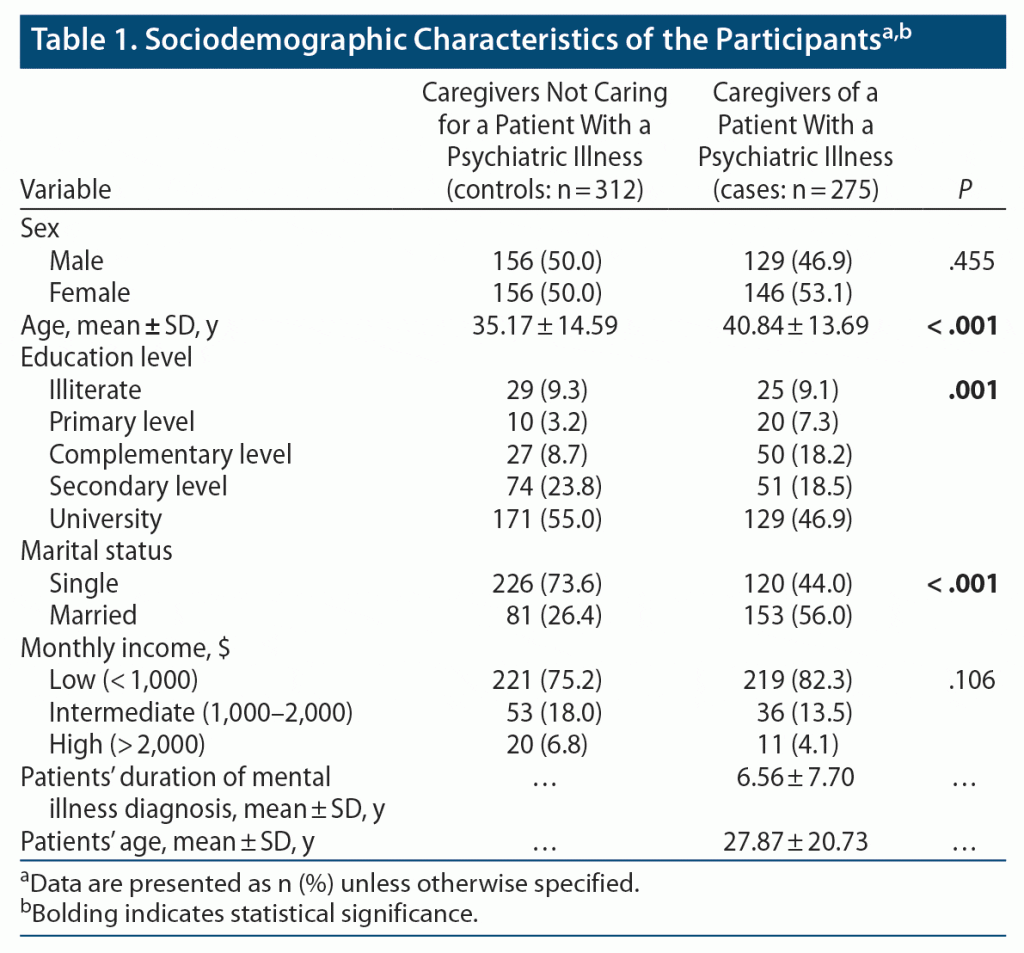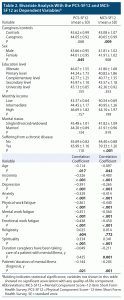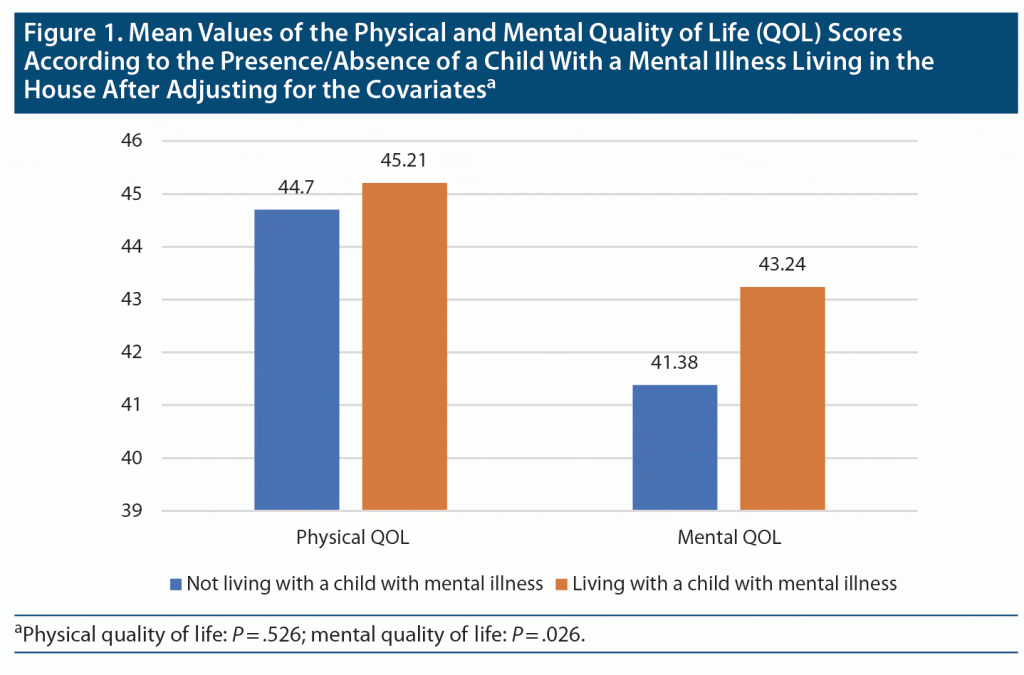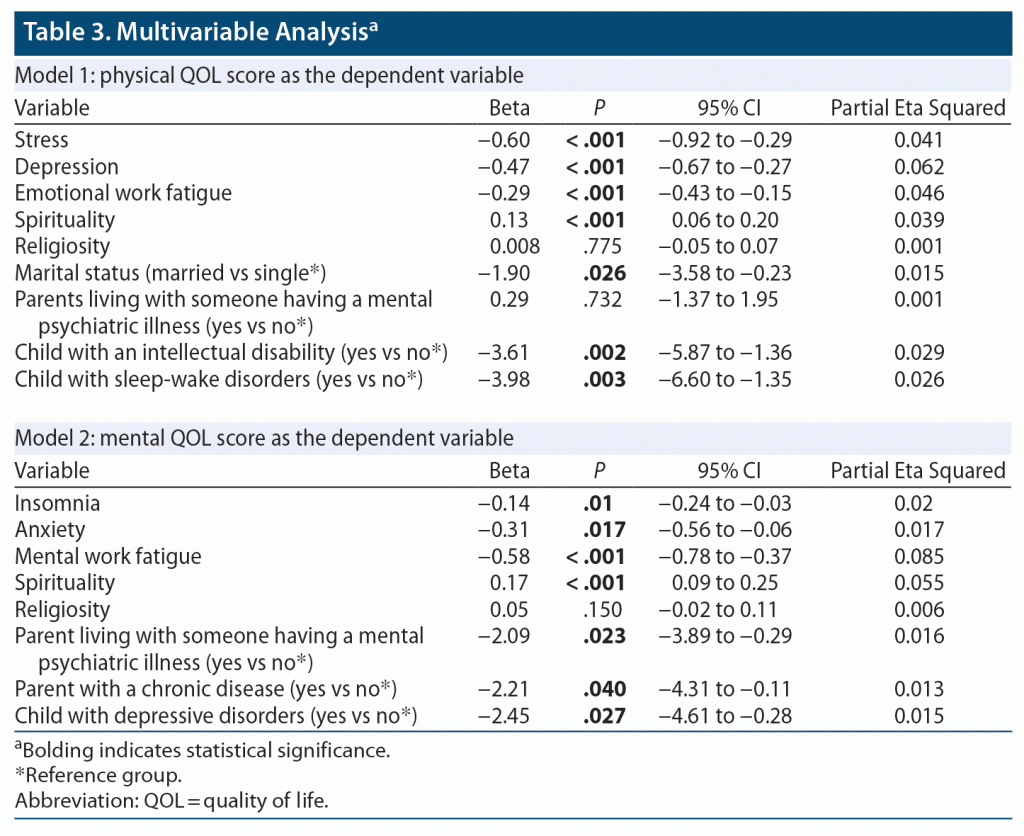ABSTRACT
Objective: To evaluate the effect of depression, anxiety, stress, insomnia, work fatigue, religiosity, and spirituality on quality of life (QOL) among family caregivers of people with mental Illness and those who care for family members without mental illness.
Methods: A case-control study was conducted between July and September 2019 that enrolled 600 caregivers using a proportionate sample from all Lebanese governorates. Participants completed a 2-part questionnaire. The first part assessed sociodemographic and other characteristics and the second part comprised various scales including the Quality of Life 12-Item Short Form Health Survey, 9-Item Patient Health Questionnaire, Generalized Anxiety Disorder 7 Item, Perceived Stress Scale, Work Fatigue Inventory, Lebanese Insomnia Scale, Mature Religiosity Scale, and Spirituality Index of Well-Being.
Results: Higher stress (P < .001), higher depression (P < .001), higher emotional work fatigue (P < .001), married parents compared to single (P = .026), having a child with an intellectual disability (P = .002), and sleep-wake disorders (P = .003) were significantly associated with lower physical QOL, whereas higher spirituality (P < .001) was associated with higher physical QOL. Higher insomnia (P = .01), higher anxiety (P = .017), higher mental work fatigue (P < .001), living with a patient having a mental psychiatric illness (P = .023), caregivers with a chronic disease (P = .040), and taking care of a child with depressive disorders (P = .027) were significantly associated with lower mental QOL, whereas higher spirituality was significantly associated with higher mental QOL.
Conclusions: The care of a person with mental illness involves multiple challenges and problems, leading to negative impacts on the familial caregivers’ mental health and magnified by the absence of sufficient support and awareness and training programs in Lebanon.
Prim Care Companion CNS Disord 2023;25(4):22m03333
Author affiliations are listed at the end of this article.
One in 4 families are caring for a family member with a mental illness,1 and in most societies, family members are often their primary caregivers.1,2 As a result, family members of mentally ill patients are under immense physical, emotional, and social strain throughout the duration of care. Almost 80% of individuals caring for family members with mental illness report it being a heavy burden3 and suffer from adverse effects directly affecting their quality of life (QOL) and mental health.2 The burden on the caregiver can have an impact on psychiatric patient hospitalization, rehospitalization, adherence, and compliance with treatment.4
QOL has been defined by the World Health Organization (WHO) “as an individual’s perception of their position in life in the context of the culture and value systems in which they live and in relation to their goals, expectations, standards, and concerns.1” This is a wide-ranging approach that incorporates physical health, psychological condition, and interpersonal relationships.1 It is known that caregivers of people suffering from mental illness are considered to be at risk for psychological problems such as depression, anxiety, fatigue, and stress.5 A study conducted in an Arab sample showed that the coexistence of anxiety and depression significantly lowered the QOL.6 Also, Wong et al7 concluded that the stress of caring for a relative with a mental illness could reduce the caregiver’s QOL. Mental and physical health are inseparably interrelated.8 Research has demonstrated that mental health problems are correlated with onset, development, and treatment of multiple chronic illnesses including cardiovascular disease9,10 and cancer.11,12
Currently, the mental health sector is neglecting family caregivers, which is demonstrated by the lack of national health awareness and intervention, leading to severe exhaustion and decreased cognitive ability encountered during and at the end of the work day (care day), which is known as work fatigue.13 Nevertheless, religion and spirituality can enhance individuals’ adaptability to stressful situations by providing a hopeful vision of the future and changing the caregiver’s perception of the care burden.14 Psychologists acknowledge the contribution of religiosity and spirituality to health and well-being.15 The difference between religiosity and spirituality is unclear, but both generally highlight the essence and purpose in life. Religion is generally linked to social beliefs and practices associated with community-based worship rituals, ceremonies, and sacred texts, while spirituality relies on a deeply rooted personal sense of a bond in which the life of each individual is considered to be attributing to a greater more valued “whole” along with a sense of belonging and acceptance.16 It was shown that religiosity is associated with intrinsic immunity against diseases, overall better QOL,17,18 and less depressive symptoms,19,20 providing a buffer effect on burden and depressive symptoms in caregivers of patients with chronic illnesses such as dementia.21
A meta-analysis showed that most at-home psychiatric patients were diagnosed with schizophrenia, depression, or other affective disorders.22 It is important to note the high prevalence of individuals caring for children or elderly parents with psychiatric disorders.23 Furthermore, evidence shows a negative correlation between duration of the psychiatric patient’s disorder and the caregiver’s overall well-being.24 The severity and duration of psychiatric disorders, as well as the associated decreased level of patient autonomy, have a direct effect on the caregivers’ physical and psychological state.
Family members are typically caregivers for individuals that require constant medical attention in Lebanon, as well as in most developing countries, where cultural and religious values prioritize the role of family, religiosity, and spirituality. Few published articles21,25,26 discuss the consequences of caring for a family member with mental illness for the caregiver, while examining the potential impact of religiosity and spirituality. This research was conducted to evaluate the effect of depression, anxiety, stress, insomnia, work fatigue, religiosity, and spirituality on QOL among family caregivers of people with mental illness and those who care for family members without mental illness.
METHODS
Study Design and Sampling
A case-control study was conducted between July and September 2019 that enrolled 600 caregivers using a proportionate sampling technique from all Lebanese governorates (Beirut, Mount Lebanon, North, South, and Bekaa). Caregivers were asked if they are taking care of a patient with a psychiatric illness, defined as having ≥ 1 of the following conditions: intellectual disabilities; autism spectrum disorder; communication disorders; motor disorders; attention-deficit/hyperactivity disorder; schizophrenia; bipolar and related disorders; depressive disorders; anxiety disorders; obsessive-compulsive and related disorder; trauma- and stressor-related disorders; dissociative disorders; somatic symptom and related disorders; feeding and eating disorders; sleep-wake disorders; sexual dysfunction; disruptive, impulse-control, and conduct disorders; substance-related and addictive disorders; neurocognitive disorders; or personality disorders as diagnosed by a physician/psychiatrist. Those who were taking care of patients with a psychiatric illness were classified as cases. Caregivers who were not taking care of a patient with a psychiatric illness were classified as controls.
A total of 275 caregivers (with a psychiatric patient at home) purchasing medication for a psychiatric patient at home were recruited from pharmacies chosen conveniently from a list provided by the Order of Pharmacists of Lebanon. A total of 312 controls (caregivers without a psychiatric patient at home) were chosen using the same technique. Caregivers from either group were not matched for age and sex. Caregivers were chosen randomly; the first caregiver entering the pharmacy and fitting the criteria of being in the case or control group was approached.
Questionnaire
The questionnaire in Arabic was administered and collected face-to-face by 5 individuals who were trained and independent of the study. On average, the questionnaire was completed within approximately 30 minutes. The questionnaire included several sections. The first part assessed the sociodemographic characteristics of the participants (sex, age, education level, profession, marital status, socioeconomic level, residential governorate, religion, and number of family members). Caregivers were also asked if they were living in the same house with a family member suffering from a mental illness and if they were taking day-to-day care of this family member, meeting their social and financial needs, and supporting their psychological disturbances. Participants taking care of a mentally ill family member were additionally asked about the period of care, whether another family member was helping them, and if they were caring for more than 1 family member. They were also assessed for chronic illness and asked if they feel that any new diagnosed illness was related to the caregiving process. The second part of the questionnaire comprised the following scales.
Quality of Life 12-Item Short Form Health Survey
Validated in Lebanon,27 the Quality of Life 12-item Short Form Health Survey (SF-12) assesses physical and mental health. The scores of each of the 2 sections range from 0 to 100. Higher scores indicate higher physical/mental QOL.28
9-Item Patient Health Questionnaire
The 9-item Patient Health Questionnaire (PHQ-9) is a self-report scale of 9 items, previously validated in Lebanon,29 which is used to evaluate depression severity. It was designed as a depressive symptom screening tool but is also used as a diagnostic indicator of major depressive disorder.30,31 Higher scores reflect higher depression (Cronbach α = 0.864).
Generalized Anxiety Disorder 7 Item
The Generalized Anxiety Disorder 7 item (GAD-7) is a self-report scale of 7 items previously validated in Lebanon29 that is focused on DSM-IV criteria and is used to quantify the severity of generalized anxiety disorders.32,33 Higher scores indicate higher anxiety (Cronbach α = 0.903).
Perceived Stress Scale
The Perceived Stress Scale is a self-report tool of 4 items that is validated in Arabic.34 Responses are measured on a 5-point scale (0 = never, 1 = almost never, 2=sometimes, 3 = fairly often, 4 = very often). Greater scores indicate more perceived stress (Cronbach α = 0.80).35
Work Fatigue Inventory
Validated in Lebanon,36 the Work Fatigue Inventory comprises 18 items used to evaluate physical, mental, and emotional work fatigue.13 This scale is divided into 3 sections related to the 3 separate energy resources, with each section including 6 questions. Greater levels of fatigue are reflected by higher scores on the 3 parts (Cronbach α = 0.967).
Lebanese Insomnia Scale
The Lebanese Insomnia Scale, validated in Lebanon,37 includes 18 items that evaluate insomnia and associated factors. All answers are measured using a Likert scale from 1 to 5. More severe sleep disturbances are reflected by higher scores (Cronbach α = 0.773).
Mature Religiosity Scale
The Mature Religiosity Scale is appropriate to apply in mental health care.38 It is a 16-item scale assessing religiosity in participants. Statements are recorded using a Likert scale ranging from 0 (strongly disagree) to 4 (strongly agree) (Cronbach α = 0.976).
Spirituality Index of Well-Being
The Spirituality Index of Well-Being includes 12 items divided into 2 subscales evaluating a person’s perceptions of their spiritual QOL. A 5-point Likert scale ranging from 1 (strongly agree) to 5 (strongly disagree) is used to measure each answer.39 The Cronbach α for the entire scale was 0.950 and for the subscales, respectively, was 0.910 and 0.933.
Translation Procedure
The scales were translated from English to Arabic and examined by a mental health specialist and then translated to English again. After this step was completed, the translators compared each scale’s English version to determine whether the variables had the same value. For all scales, no considerable differences were found.
Statistical Analysis
SPSS software version 25 was used to conduct data analysis. A Cronbach α value was recorded for reliability analysis for all scales. A descriptive analysis was done using the absolute frequency and percentages for categorical variables and mean and standard deviation for quantitative measures. To compare continuous variables between 2 groups, the Student t test was used. Pearson correlation was used for linear correlation between continuous variables. A multivariate analysis of covariance (MANCOVA) was carried out to compare multiple measures (physical and mental QOL scores taken as dependent variables) between the different factors, considering potential confounding variables: age, sex, education level, monthly income, spirituality, depression, anxiety, stress, insomnia, and work fatigue.
RESULTS
The sociodemographic and other characteristics of the sample are summarized in Table 1. The results showed that the mean ± SD age of participants caring for someone with mental illness (cases) was 40.84 ± 13.69 years, with 53.1% females. The majority had a low monthly income (82.3%), 46.9% had a university level of education, and 56% were married. Those who were not caring for someone with mental illness (controls) had a mean ± SD age of 35.17 ± 14.59 years, with 50% females. More than half of the controls (55.0%) had a university level of education, were single (73.6%), and had a low monthly income (75.2%). A significantly higher proportion of controls had a university-level education and were single compared to the caregivers. Also, a significantly higher mean age was found in cases compared to controls.
Bivariate Analysis
A significantly higher mean QOL SF-12 physical component score (PCS-SF12) was found in males compared to females (45.66 vs 44.01, P = .045). Higher age; insomnia; depression; anxiety; physical, mental, and emotional work fatigue; and patient years diagnosed with mental disorder were significantly associated with lower physical QOL, whereas higher spirituality was significantly associated with higher physical QOL.
A significantly higher mean QOL SF-12 mental component score (MCS-SF12) was found in controls compared to cases (43.08 vs 40.65, P = .009) and in those not suffering from chronic disease compared to those that were (44.40 vs 39.33, P < .001). Higher age; insomnia; depression; anxiety; physical, mental, and emotional work fatigue; number of years taking care of a patient with mental illness; and patient years diagnosed with a mental disorder were significantly associated with lower mental QOL, whereas higher spirituality was significantly associated with higher mental QOL (Table 2).
Adjusted Means
The means of the physical and mental QOL scores according to the presence/absence of a child with a mental illness living with them in the house after adjusting for the covariates that showed significance in the bivariate analysis are shown in Figure 1. The results revealed significantly lower mental, but not physical, QOL scores in parents who had a child with a mental illness living with them in the house compared to those who did not.
Multivariable Analysis (MANCOVA)
Higher stress (B = −0.0), higher depression (B = −0.47), higher emotional work fatigue (B = −0.29), married parents compared to single parents (B = −1.90), having a child with an intellectual disability (B = −3.61), and sleep-wake disorders (B = −3.98) were significantly associated with lower physical QOL, whereas higher spirituality (B = 0.13) was associated with higher physical QOL (Table 3, Model 1). It is noteworthy that living with a child with a mental illness compared to not and religiosity were not associated with physical QOL.
Higher insomnia (B = −0.14), higher anxiety (B = −0.31), higher mental work fatigue (B = −0.58), living with a patient having a mental psychiatric illness versus not (B = −2.09), caregivers with a chronic disease compared to not (B = −2.21), and taking care of a child with depressive disorders (B = −2.45) were significantly associated with lower mental QOL, whereas higher spirituality (B = 0.17) was significantly associated with higher mental QOL (Table 3, Model 2). It is noteworthy that religiosity was not associated with mental QOL.
DISCUSSION
This study demonstrated that caregivers of patients with mental illness had higher stress, depression, anxiety, sleep disturbances, and work fatigue, as well as lower QOL, compared to caregivers of people without mental illness. Furthermore, higher physical and mental QOL were associated with higher spirituality, and no significant association was found with religiosity.
Depression, Anxiety, Stress, Insomnia, QOL, and Family Caregivers
The results of this study show that a decrease in mental and physical QOL was associated with higher levels of depression, anxiety, stress, and insomnia among family caregivers. Stress, anxiety, and depression have been shown in several studies to be higher among individuals living with a mentally ill relative suffering from schizophrenia,40–42 bipolar disorder,43 or dementia.44 Female caregivers have higher levels of anxiety, depression, and stress.45 Caregivers of schizophrenia patients displayed the highest levels of stress among those who care for chronically ill family members.46 Depression and anxiety were the most common comorbidities associated with insomnia.47 Additionally, sleep disorders, depression, and anxiety were interrelated and confirmed predictors of each other.48 Furthermore, sleep disturbances can be mediated by anxiety, which can manifest as daytime sleepiness.49 A study50 of insomnia in caregivers of persons with dementia found that new-onset sleep disturbances may appear after several months of providing care, despite not having sleep disorders initially. Additionally, depression and anterior level of objective burden were among the strongest predictors of caregiver sleep problems.50 Long-term family caregivers of patients with schizophrenia had high levels of anxiety and depression and low physical QOL.51 A previous study52 showed that family caregivers of patients with mental illness displayed more severe depressive symptoms, which subsequently negatively affected their physical QOL. More than half of caregivers of patients with severe mental illness showed very poor QOL.53 These findings can be considered a direct reflection of the health care system’s failure to assist family caregivers with their needs and to address their daily concerns.54 These associations can have tremendous negative repercussions on family caregivers’ mental health in small low-income countries such as Lebanon. It has been shown that caregivers in Asian countries are more prone to hide their psychological disturbances because of traditional values such as honor, which can often lead to the loss of social support55 and deterioration in QOL.
Work Fatigue and Family Caregivers
The results of this study show a potential association between being a family caregiver of mentally ill individuals and having higher levels of physical, mental, and emotional work fatigue compared to participants not taking care of a relative with a psychiatric illness. The 3-dimensional Work Fatigue Scale, to the best of our knowledge, has rarely been used in previous research to assess work fatigue results, making our results difficult to compare. These findings are in line with the results of a study from Brazil that assessed burnout in familial caregivers of patients with dementia, wherein emotional exhaustion was the greatest documented burnout dimension in the included individuals and was associated with depression among caregivers.56 Another study57 found that 71% of family caregivers of chronically ill patients exhibited work fatigue. Additionally, caregivers of patients with severe mental illness displayed higher depression and work fatigue.58
Spirituality, Religiosity, and Family Caregivers
Higher spirituality is associated with higher physical and mental QOL. Previous research about spirituality, religiosity, and family caregiving shows conflicting results: a past study found no significant relationship between religiosity and QOL among caregivers of patients of mental illness,59 while another investigation found that spiritual caregivers displayed higher depression, stress, and work fatigue.60 However, family caregivers of individuals with chronic illnesses who were spiritual were more likely to have a positive attitude toward their responsibilities.61 Similarly, religious family caregivers of patients with mental illness showed a more positive attitude.62 Caregivers may have a negative perception of the care responsibilities, perceiving them as punishment from God. On the other hand, a positive perception can be adopted in which religious commitment and spirituality may mitigate the stress and negative effects and lessen the degree of deterioration of the caregiver’s QOL.63 In Lebanon, many family caregivers try to honor family values and religious beliefs; nonetheless it seems necessary to assess spirituality of these caregivers and intervene with spiritual support to protect their mental health if needed.26
Clinical Implications
Health care professionals can play an important role in decreasing the levels of caregivers’ depression and anxiety by advocating for the screening and evaluation of caregivers during their relatives’ routine visits to clinicians. Promotion of mental health is essential in motivating the family caregivers of mentally ill individuals and addressing their psychological needs by creating an inclusive environment that emphasizes social support and respect. While it might not be applicable to encourage all caregivers to become more religious or spiritual, clinicians might help caregivers and enhance their therapeutic strategies by encouraging them to connect their spiritual system to the caregiving experience.
Limitations
The present study is subject to several limitations. First, exposure and effect were measured concomitantly, thus no causality can be inferred from the results. A selection bias is possible, since participants with a higher education level and socioeconomic status might have been entering pharmacies during the study. The questionnaire was self‐report; thus, an overestimation or underestimation of the symptoms, pertinent details, and subjective measures might be present, leading to reporting bias. Additionally, some questions may not have been well understood by the participants, which increases the risk of information bias. Residual confounding bias is also possible since not all factors that might affect QOL were taken into consideration. On the other hand, the study shows significant strengths. First, we attempted to include caregivers from various Lebanese governorates, which improves the generalizability of the results. This study is one of the few investigations, if not the first with a similar sample size done in Lebanon, to cast a light on the assessment of the mental health of family caregivers of mentally ill patients.
CONCLUSION
Care of a family member with mental illness involves several challenges and problems, leading to negative impacts on the familial caregivers’ mental health. In Lebanon, family caregivers of individuals suffering from a mental illness are often neglected and have difficulties in the absence of sufficient support and awareness/training programs at a national level. The present findings stress the need to place particular attention on the education of mentally ill patients and their family caregivers about psychiatric illness, symptoms, the importance of treatment, and regular follow-up by their treating doctors.
Article Information
Published Online: July 18, 2023. https://doi.org/10.4088/PCC.22m03333
© 2023 Physicians Postgraduate Press, Inc.
Submitted: June 4, 2022; accepted July 28, 2022.
To Cite: Semaan S, Haddad C, Awad E, et al. Caring for a mentally ill patient, mental illness, religiosity, and spirituality and their association with family caregivers’ quality of life in Lebanon. Prim Care Companion CNS Disord. 2023;25(4):22m03333.
Author Affiliations: School of Medicine and Medical Sciences, Holy Spirit University of Kaslik, Jounieh, Lebanon (Semaan, R Hallit, S Hallit); Department of Research, Psychiatric Hospital of the Cross, Jal Eddib, Lebanon (Haddad, S Hallit); Institut National de Sante Publique, Epidemiologie Clinique et Toxicologie, Beirut, Lebanon (Haddad, Sacre, Akel, Salameh); Infectious Disease Department, Notre Dame des Secours University Hospital Center, Byblos, Lebanon (R Hallit); Infectious Disease Department, Bellevue Medical Center, Mansourieh, Lebanon (R Hallit); School of Medicine, Lebanese American University, Byblos, Lebanon (Salameh); Faculty of Pharmacy, Lebanese University, Hadat, Lebanon (Salameh); Department of Primary Care and Population Health, University of Nicosia Medical School, Nicosia, Cyprus (Salameh); Department of Social and Education Sciences, School of Arts and Sciences, Lebanese American University, Jbeil, Lebanon (Awad, Obeid); Applied Science Research Center, Applied Science Private University, Amman, Jordan(S Hallit).
Corresponding Author: Souheil Hallit, PharmD, MSc, MPH, PhD, School of Medicine and Medical Sciences, Holy Spirit University of Kaslik, PO Box 446, Jounieh, Lebanon ([email protected]).
Author Contributions: Drs Salameh, Obeid, and S Hallit are last coauthors.
Relevant Financial Relationships: None.
Funding/Support: None.
Ethics Approval and Consent to Participate: The Psychiatric Hospital of the Cross Ethics and Research Committee approved this study protocol (HPC-017-2019). A written consent was obtained from each participant.
Acknowledgments: The authors would like to thank the caregivers for agreeing to be part of this study.
Additional Information: There is no public access to the data generated or analyzed during this study to preserve the privacy of the identities of the individuals. The dataset that supports the conclusions is available to the corresponding author upon request.
Clinical Points
- Insomnia, anxiety, mental work fatigue, and living with a patient having a mental psychiatric illness were associated with lower mental quality of life (QOL).
- Higher spirituality was associated with higher mental QOL.
- The care of a person with mental illness involves multiple challenges and problems, leading to negative impacts on the familial caregivers’ mental health.
References (63)

- World Health Organization. Investing in mental health: evidence for action. 2013. Accessed June 10, 2023. https://apps.who.int/iris/handle/10665/87232
- Chadda RK. Caring for the family caregivers of persons with mental illness. Indian J Psychiatry. 2014;56(3):221–227. PubMed CrossRef
- Magliano L, Fiorillo A, De Rosa C, et al; National Mental Health Project Working Group. Family burden in long-term diseases: a comparative study in schizophrenia vs physical disorders. Soc Sci Med. 2005;61(2):313–322. PubMed CrossRef
- Kate N, Grover S, Kulhara P, et al. Caregiving appraisal in schizophrenia: a study from India. Soc Sci Med. 2013;98:135–140. PubMed CrossRef
- Ampalam P, Gunturu S, Padma V. A comparative study of caregiver burden in psychiatric illness and chronic medical illness. Indian J Psychiatry. 2012;54(3):239–243. PubMed CrossRef
- Ohaeri JU, Awadalla AW. Characteristics of subjects with comorbidity of symptoms of generalized anxiety and major depressive disorders and the corresponding threshold and subthreshold conditions in an Arab general population sample. Med Sci Monit. 2012;18(3):CR160–CR173. PubMed CrossRef
- Wong DFK, Lam AYK, Chan SK, et al. Quality of life of caregivers with relatives suffering from mental illness in Hong Kong: roles of caregiver characteristics, caregiving burdens, and satisfaction with psychiatric services. Health Qual Life Outcomes. 2012;10(1):15. PubMed CrossRef
- Barile JP, Reeve BB, Smith AW, et al. Monitoring population health for Healthy People 2020: evaluation of the NIH PROMIS Global Health, CDC Healthy Days, and satisfaction with life instruments. Qual Life Res. 2013;22(6):1201–1211. PubMed CrossRef
- Jonas BS, Franks P, Ingram DD. Are symptoms of anxiety and depression risk factors for hypertension? Longitudinal evidence from the National Health and Nutrition Examination Survey I epidemiologic follow-up study. Arch Fam Med. 1997;6(1):43–49. PubMed CrossRef
- Jonas BS, Mussolino ME. Symptoms of depression as a prospective risk factor for stroke. Psychosom Med. 2000;62(4):463–471. PubMed CrossRef
- McKnight-Eily L, Presley-Cantrell L, Elam-Evans L, et al. Prevalence and correlates of current depressive symptomatology and lifetime diagnosis of depression in Black women. Womens Health Issues. 2009;19(4):243–252. PubMed CrossRef
- Chapman DP, Perry GS, Strine TW. The vital link between chronic disease and depressive disorders. Prev Chronic Dis. 2005;2(1):A14. PubMed
- Frone MR, Tidwell MO. The meaning and measurement of work fatigue: development and evaluation of the Three-Dimensional Work Fatigue Inventory (3D-WFI). J Occup Health Psychol. 2015;20(3):273–288. PubMed CrossRef
- Ogilvie AD, Morant N, Goodwin GM. The burden on informal caregivers of people with bipolar disorder. Bipolar Disord. 2005;7(suppl 1):25–32. PubMed CrossRef
- Hill PC, Pargament KI. Advances in the conceptualization and measurement of religion and spirituality: implications for physical and mental health research. Am Psychol. 2003;58(1):64–74. PubMed CrossRef
- Dein S, Cook CC, Powell A, et al. Religion, spirituality and mental health. Psychiatrist. 2010;34(2):63–64. CrossRef
- Bravin AM, Trettene ADS, Andrade LGM, et al. Benefits of spirituality and/or religiosity in patients with chronic kidney disease: an integrative review. Rev Bras Enferm. 2019;72(2):541–551. PubMed CrossRef
- Mishra SK, Togneri E, Tripathi B, et al. Spirituality and religiosity and its role in health and diseases. J Relig Health. 2017;56(4):1282–1301. PubMed CrossRef
- Chaar EA, Hallit S, Hajj A, et al. Evaluating the impact of spirituality on the quality of life, anxiety, and depression among patients with cancer: an observational transversal study. Support Care Cancer. 2018;26(8):2581–2590. PubMed CrossRef
- Gwin S, Branscum P, Taylor L, et al. Associations between depressive symptoms and religiosity in young adults. J Relig Health. 2019;59(6):3193–3210. PubMed
- Yoon KH, Moon YS, Lee Y, et al; CARE (Caregivers of Alzheimer’s Disease Research) Investigators. The moderating effect of religiosity on caregiving burden and depressive symptoms in caregivers of patients with dementia. Aging Ment Health. 2018;22(1):141–147. PubMed CrossRef
- Shi Y, Shao Y, Li H, et al. Correlates of affiliate stigma among family caregivers of people with mental illness: a systematic review and meta-analysis. J Psychiatr Ment Health Nurs. 2019;26(1-2):49–61. PubMed CrossRef
- Patel M, Head S, Dwyer J, et al. Youth transition home from residential mental health treatment: caregivers’ perspective. Child Adolesc Social Work J. 2019;36(5):485–494. CrossRef
- Siddiqui S, Khalid J. Determining the caregivers’ burden in caregivers of patients with mental illness. Pak J Med Sci. 2019;35(5):1329–1333. PubMed CrossRef
- Murray-Swank AB, Lucksted A, Medoff DR, et al. Religiosity, psychosocial adjustment, and subjective burden of persons who care for those with mental illness. Psychiatr Serv. 2006;57(3):361–365. PubMed CrossRef
- Hebert RS, Dang Q, Schulz R. Religious beliefs and practices are associated with better mental health in family caregivers of patients with dementia: findings from the REACH study. Am J Geriatr Psychiatry. 2007;15(4):292–300. PubMed CrossRef
- Haddad C, Sacre H, Obeid S, et al. Validation of the Arabic version of the “12-item Short-Form Health Survey” (SF-12) in a sample of Lebanese adults. Arch Public Health. 2021;79(1):56. PubMed CrossRef
- Ware J, Kosinski M, Keller S. How to Score the SF‐12 Physical and Mental Health Summary Scales. Qualitymetric Inc; 1998.
- Dagher D, Samaha S, Mhanna M, et al. Depressive symptoms among a sample of Lebanese adolescents: Scale validation and correlates with disordered eating. Arch Pediatr. 2023;S0929-693X(23):00094–00095. PubMed CrossRef >
- Kroenke K, Spitzer RL. The PHQ-9: a new depression diagnostic and severity measure. Psychiatr Ann. 2002;32(9):509–515. CrossRef
- Kroenke K, Spitzer RL, Williams JB. The PHQ-9: validity of a brief depression severity measure. J Gen Intern Med. 2001;16(9):606–613. PubMed CrossRef
- Kroenke K, Spitzer RL, Williams JB, et al. Anxiety disorders in primary care: prevalence, impairment, comorbidity, and detection. Ann Intern Med. 2007;146(5):317–325. PubMed CrossRef
- Kroenke K, Spitzer RL, Williams JB, et al. The Patient Health Questionnaire somatic, anxiety, and depressive symptom scales: a systematic review. Gen Hosp Psychiatry. 2010;32(4):345–359. PubMed CrossRef
- Almadi T, Cathers I, Hamdan Mansour AM, et al. An Arabic version of the Perceived Stress Scale: translation and validation study. Int J Nurs Stud. 2012;49(1):84–89. PubMed CrossRef
- Cohen S, Kamarck T, Mermelstein R. A global measure of perceived stress. J Health Soc Behav. 1983;24(4):385–396. PubMed CrossRef
- Sfeir E, Rabil JM, Obeid S, et al. Work fatigue among Lebanese physicians and students during the COVID-19 pandemic: validation of the 3D-Work Fatigue Inventory (3D-WFI) and correlates. BMC Public Health. 2022;22(1):292. PubMed CrossRef
- Hallit S, Sacre H, Haddad C, et al. Development of the Lebanese Insomnia Scale (LIS-18): a new scale to assess insomnia in adult patients. BMC Psychiatry. 2019;19(1):421. PubMed CrossRef
- deVries-Schot MR, Pieper JZ, Van Uden MH. Mature Religiosity Scale: validity of a new questionnaire. Eur J Ment Health. 2012;7(1):57–71. CrossRef
- Daaleman TP, Frey BB. The Spirituality Index of Well-Being: a new instrument for health-related quality-of-life research. Ann Fam Med. 2004;2(5):499–503. PubMed CrossRef
- Rosenfarb IS, Bellack AS, Aziz N. A sociocultural stress, appraisal, and coping model of subjective burden and family attitudes toward patients with schizophrenia. J Abnorm Psychol. 2006;115(1):157–165. PubMed CrossRef
- Chien WT, Chan SW, Morrissey J. The perceived burden among Chinese family caregivers of people with schizophrenia. J Clin Nurs. 2007;16(6):1151–1161. PubMed CrossRef
- Alexander G, Bebee C-E, Chen K-M, et al. Burden of caregivers of adult patients with schizophrenia in a predominantly African ancestry population. Qual Life Res. 2016;25(2):393–400. PubMed CrossRef
- Steele A, Maruyama N, Galynker I. Psychiatric symptoms in caregivers of patients with bipolar disorder: a review. J Affect Disord. 2010;121(1-2):10–21. PubMed CrossRef
- Jihène BT, Feriel J, Nada C, et al. Depression and level of burden among family caregivers of demented patients in Tunisia. Pan Afr Med J. 2011;10:45. PubMed
- Cabral L, Duarte J, Ferreira M, et al. Anxiety, stress and depression in family caregivers of the mentally ill. Aten Primaria. 2014;46(suppl 5):176–179. PubMed CrossRef
- Masa’Deh R. Perceived stress in family caregivers of individuals with mental illness. J Psychosoc Nurs Ment Health Serv. 2017;55(6):30–35. PubMed CrossRef
- Buysse DJ, Angst J, Gamma A, et al. Prevalence, course, and comorbidity of insomnia and depression in young adults. Sleep. 2008;31(4):473–480. PubMed CrossRef
- Shanahan L, Copeland WE, Angold A, et al. Sleep problems predict and are predicted by generalized anxiety/depression and oppositional defiant disorder. J Am Acad Child Adolesc Psychiatry. 2014;53(5):550–558. PubMed CrossRef
- Hasler G, Buysse DJ, Gamma A, et al. Excessive daytime sleepiness in young adults: a 20-year prospective community study. J Clin Psychiatry. 2005;66(4):521–529. PubMed CrossRef
- McCurry SM, Gibbons LE, Logsdon RG, et al. Insomnia in caregivers of persons with dementia: who is at risk and what can be done about it? Sleep Med Clin. 2009;4(4):519–526. PubMed CrossRef
- Yu Y, Tang BW, Liu ZW, et al. Who cares for the schizophrenia individuals in rural China: a profile of primary family caregivers. Compr Psychiatry. 2018;84:47–53. PubMed CrossRef
- Chang S, Zhang Y, Jeyagurunathan A, et al. Providing care to relatives with mental illness: reactions and distress among primary informal caregivers. BMC Psychiatry. 2016;16(1):80. PubMed CrossRef
- Ndikuno C, Namutebi M, Kuteesa J, et al. Quality of life of caregivers of patients diagnosed with severe mental illness at the national referral hospitals in Uganda. BMC Psychiatry. 2016;16(1):400. PubMed CrossRef
- Boyer L, Caqueo-Urízar A, Richieri R, et al. Quality of life among caregivers of patients with schizophrenia: a cross-cultural comparison of Chilean and French families. BMC Fam Pract. 2012;13(1):42. PubMed CrossRef
- Chan SW. Global perspective of burden of family caregivers for persons with schizophrenia. Arch Psychiatr Nurs. 2011;25(5):339–349. PubMed CrossRef
- Truzzi A, Valente L, Ulstein I, et al. Burnout in familial caregivers of patients with dementia. Br J Psychiatry. 2012;34(4):405–412. PubMed CrossRef
- Lynch SH, Shuster G, Lobo ML. The family caregiver experience - examining the positive and negative aspects of compassion satisfaction and compassion fatigue as caregiving outcomes. Aging Ment Health. 2018;22(11):1424–1431. PubMed CrossRef
- Sun X, Ge J, Meng H, et al. The influence of social support and care burden on depression among caregivers of patients with severe mental illness in rural areas of Sichuan, China. Int J Environ Res Public Health. 2019;16(11):1961. PubMed CrossRef
- Caqueo-Urízar A, Alessandrini M, Zendjidjian X, et al. Religion involvement and quality of life in caregivers of patients with schizophrenia in Latin-America. Psychiatry Res. 2016;246:769–775. PubMed CrossRef
- González-Rivera JA, Rosario-Rodríguez A. Spirituality and self-efficacy in caregivers of patients with neurodegenerative disorders: an overview of spiritual coping styles. Religions (Basel). 2018;9(9):276. CrossRef
- Chafjiri RT, Navabi N, Shamsalinia A, et al. The relationship between the spiritual attitude of the family caregivers of older patients with stroke and their burden. Clin Interv Aging. 2017;12:453–458. PubMed CrossRef
- Pearce MJ, Medoff D, Lawrence RE, et al. Religious coping among adults caring for family members with serious mental illness. Community Ment Health J. 2016;52(2):194–202. PubMed CrossRef
- Akbari M, Alavi M, Irajpour A, et al. Challenges of family caregivers of patients with mental disorders in Iran: a narrative review. Iran J Nurs Midwifery Res. 2018;23(5):329–337. PubMed
Enjoy this premium PDF as part of your membership benefits!









